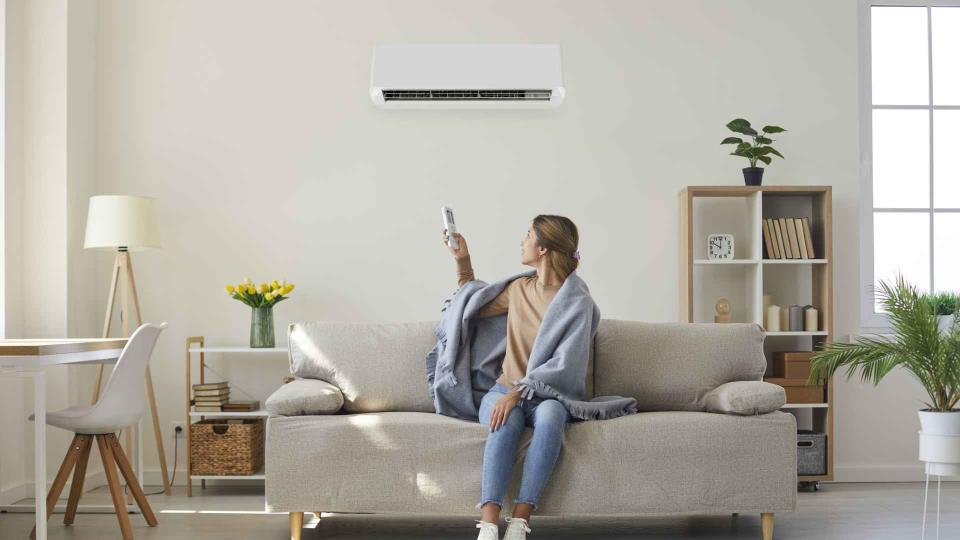Heat Your Home Cheaper and More Efficiently: 6+ Monetary Incentives Offered by the Inflation Reduction Act

With colder weather quickly coming to many parts of the country, it’s not only a good idea to find ways to lower your heating bills, but to start thinking about future government-supported incentives offered through the passing of the Inflation Reduction Act (IRA) in 2022.
See: 8 Frugal Habits of the Past To Save Money Today
Find: Get Rid of These Devices This Winter That Add Hundreds to Your Electricity Bill
As its name suggests, inflation reduction is a major goal of the legislation, but the act also heavily promotes clean energy initiatives and investing in domestic energy production. “The most significant action Congress has taken on clean energy and climate change in the nation’s history,” per the White House, gives homeowners the opportunity to save money while they make their houses more energy-efficient.
Rebates and Incentives Offered by the Inflation Reduction Act
Under the Inflation Reduction Act, $9 billion has been allocated to total energy rebates. Because electricity can be operated by renewable energy sources, switching from natural gas to electric-powered home heating sources and gas appliances to electric could result in large rebates and credits for homeowners.
Due to roll out to some areas after June of 2024 and expected to be available everywhere at the start of 2025, rebates will be available to low- and moderate-income homeowners whose household income doesn’t exceed 150% of the area median income as calculated by the Department of Housing and Urban Development. Those that don’t qualify for rebates can still get tax credits for things like heat pump installations and other energy-saving installations like an induction stove or new windows or doors.
Also: 8 Ways You’re Wasting Money at the Grocery Store
Homeowners looking to save money to electrify or make their homes more energy efficient may take advantage of these six IRA-offered rebates:
Up to $1,750 for converting to a heat pump water heaters.
Up to $8,000 for a heat pump HVAC system.
Up to $840 to offset the cost of appliances like a heat-pump dryer or electric stove.
Up to $4,000 for upgrading electrical panels/breaker boxes.
Up to $1,600 for insulation and sealing improvements.
Up to $2,500 for electric wiring repairs or improvements.
However, there are incentives available to homeowners for 2023. The IRA has extended Energy Efficient Home Improvement income tax credits, which allow taxpayers to deduct a 30% of the cost of renewable energy systems from their federal taxes, as well as up to $2,000 on central air conditioning systems, boilers, furnaces, air-source heat pumps and biomass stoves that reach benchmarks for high efficiency.
Additionally, the legislation revives a 30% tax credit for installing residential solar panels and extends the program until Dec. 31, 2034 (the tax credit would decline to 26% for solar panels put into service after Dec. 31, 2032 and before Jan. 1, 2034). Homeowners who install solar battery systems with at least 3 kilowatt-hours of capacity would also qualify for the tax credit.
Ways To Save on Utility Bills This Winter
Until some of these rebates are available — or if you can’t commit to buying new energy efficient appliances or solar panels this year — there are things you can do around the house to keep you warm in winter and save you money on your energy bills.
Have your heating unit inspected before you need to use it (and change your furnace filters regularly).
Upgrade to energy-efficient windows.
Seal air leaks and insulate your home.
Get a programmable or “smart” thermostat.
Keep that thermostat set at 68 degrees (per the U.S. Department of Energy).
Turn the heat down when you’re away.
Use space heaters wisely.
Book an energy audit to find where your home’s heating and cooling efficiency is lacking.
More From GOBankingRates
This article originally appeared on GOBankingRates.com: Heat Your Home Cheaper and More Efficiently: 6+ Monetary Incentives Offered by the Inflation Reduction Act

 Yahoo Finance
Yahoo Finance 